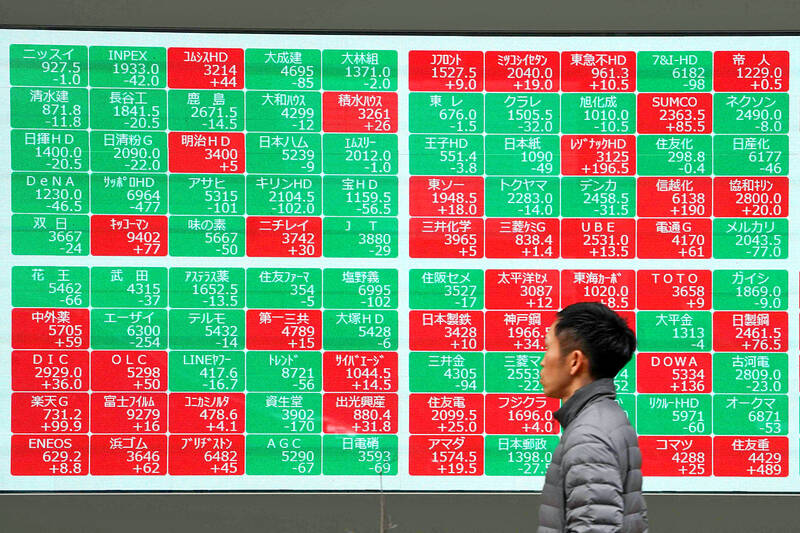The Japanese economy is now the world’s fourth-largest after it contracted in the fourth quarter of last year and fell behind Germany.
The Japanese government reported the economy shrank at an annual rate of 0.4 percent in October to December last year, while Japanese Cabinet Office data showed that real GDP grew 1.9 percent for the whole year.
The Japanese economy contracted 2.9 percent from July to September last year. Two straight quarters of contraction are considered an indicator an economy is in a technical recession.

Photo: AFP
Japanese economy was the second-largest until 2010, when it was overtaken by Chinise economy. Japan’s nominal GDP totaled US$4.2 trillion last year, while Germany’s was US$4.4 trillion or US$4.5 trillion, depending on the currency conversion.
A weaker yen was a key factor in the drop to fourth place, since comparisons of nominal GDP are in US dollar terms.
However, Japan’s relative weakness also reflects a decline in its population and lagging productivity, economists said.
Real GDP is a measure of the value of a nation’s products and services. The annual rate measures what would have happened if the quarterly rate lasted a year.
Japan was historically touted as “an economic miracle,” rising from the ashes of World War II to become the second-largest economy after the US. It kept that going through the 1970s and 1980s.

The Taiwanese passport ranked 33rd in a global listing of passports by convenience this month, rising three places from last month’s ranking, but matching its position in January last year. The Henley Passport Index, an international ranking of passports by the number of designations its holder can travel to without a visa, showed that the Taiwan passport enables holders to travel to 139 countries and territories without a visa. Singapore’s passport was ranked the most powerful with visa-free access to 192 destinations out of 227, according to the index published on Tuesday by UK-based migration investment consultancy firm Henley and Partners. Japan’s and

NATIONAL SECURITY THREAT: An official said that Guan Guan’s comments had gone beyond the threshold of free speech, as she advocated for the destruction of the ROC China-born media influencer Guan Guan’s (關關) residency permit has been revoked for repeatedly posting pro-China content that threatens national security, the National Immigration Agency said yesterday. Guan Guan has said many controversial things in her videos posted to Douyin (抖音), including “the red flag will soon be painted all over Taiwan” and “Taiwan is an inseparable part of China,” while expressing hope for expedited “reunification.” The agency received multiple reports alleging that Guan Guan had advocated for armed reunification last year. After investigating, the agency last month issued a notice requiring her to appear and account for her actions. Guan Guan appeared as required,

Japan and the Philippines yesterday signed a defense pact that would allow the tax-free provision of ammunition, fuel, food and other necessities when their forces stage joint training to boost deterrence against China’s growing aggression in the region and to bolster their preparation for natural disasters. Japan has faced increasing political, trade and security tensions with China, which was angered by Japanese Prime Minister Sanae Takaichi’s remark that a Chinese attack on Taiwan would be a survival-threatening situation for Japan, triggering a military response. Japan and the Philippines have also had separate territorial conflicts with Beijing in the East and South China

A strong cold air mass is expected to arrive tonight, bringing a change in weather and a drop in temperature, the Central Weather Administration (CWA) said. The coldest time would be early on Thursday morning, with temperatures in some areas dipping as low as 8°C, it said. Daytime highs yesterday were 22°C to 24°C in northern and eastern Taiwan, and about 25°C to 28°C in the central and southern regions, it said. However, nighttime lows would dip to about 15°C to 16°C in central and northern Taiwan as well as the northeast, and 17°C to 19°C elsewhere, it said. Tropical Storm Nokaen, currently